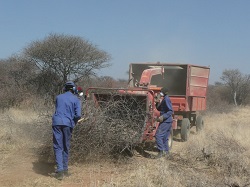
Hamburg environmentalists oppose local bush wood -Local biomass industry embarks on feasibility study

More than a dozen civil society organizations and scientists have spoken out against plans to fire Hamburg power plants like the Tiefstack combined heat and power station with bush wood from Namibia.
In May this year, the German Association for International Cooperation (GIZ) and the Namibia Biomass Industry Group announced the beginning of talks to establish a sustainable and long-term sustainable supply chain for purchasing biomass from Namibia to be used in Hamburg.
Opposition signatories called on the Hamburg Environmental Protection Authorities to stop pursuing this project and to work towards an energy supply for Hamburg that is in line with the binding goals of the 2013 referendum on the repurchasing of the energy networks. The referendum obliges the Hamburg Senate to pursue the goal of a ‘socially just, climate friendly and democratically controlled energy supply from renewable energies.
The signatories noted that the intended burning of bush wood from Namibia contradicts this goal.
In response, Namibia Biomass Industry Group this week announced that they have agreed on a feasibility process that consists of targeted working groups and public consultation workshops, where the final results are expected in mid-2021.
CEO of the association, Progress Kashandula, said they are confident that the feasibility process will lead to valuable insights into the viability of biomass exports, whereby all aspects of potential biomass exports will be carefully examined, including environmental sustainability, compliance with climate policy, social impact and economic viability.
“There is currently no commitment to biomass exports by any of the involved parties, as it is dependent on the outcome of the thorough and objective feasibility process,” Kashandula said.
Kashandula explained charcoal production has become a major contributor to agricultural exports, with goals to further grow and modernise the sector, adding that a vibrant bushbiomass sector will provide room for unskilled labour as well as for formal qualifications in support of (semi-) mechanised harvesting processes, this is in line with strategic development goals and Namibia’s development agenda.
“Thus, unsubstantiated calls for the sector not to explore the modernisation of harvesting methods and to disregard potentials to explore industrialised value chains, do not seem to be based on the interest to develop Namibia’s economy and provide livelihoods for its people,” Kashandula said.















































